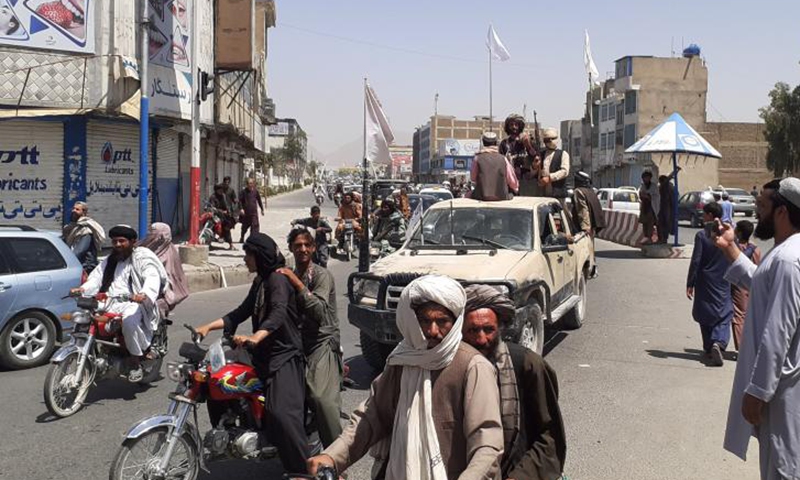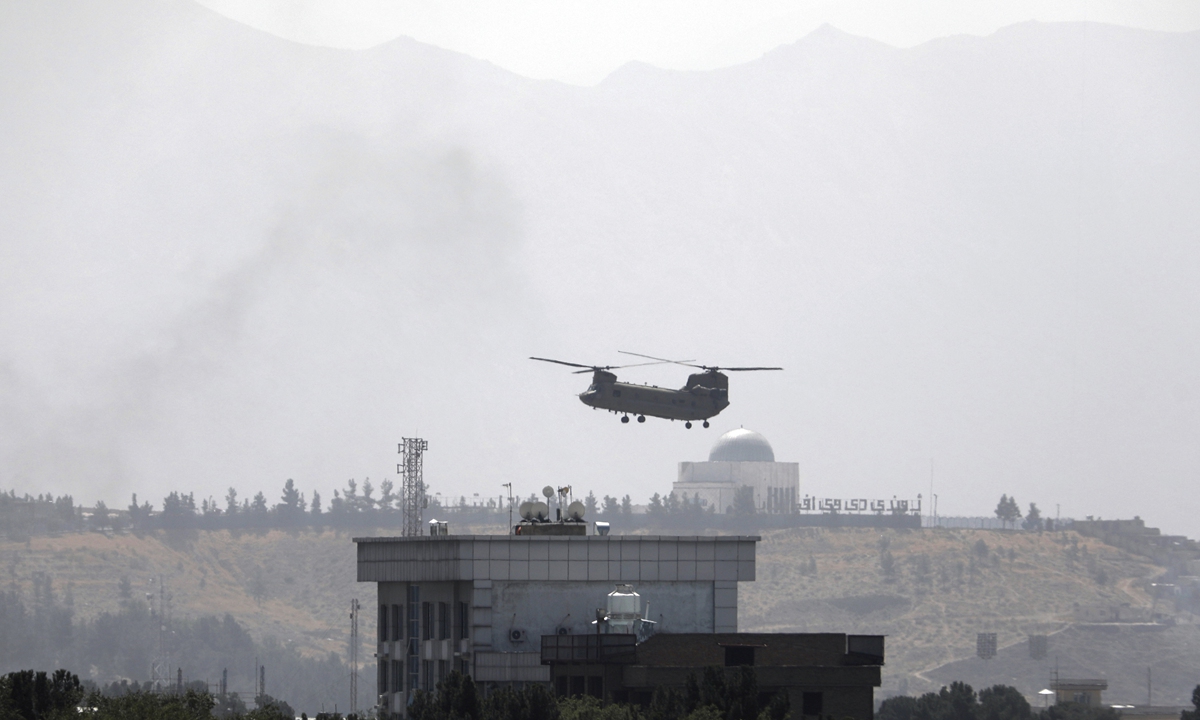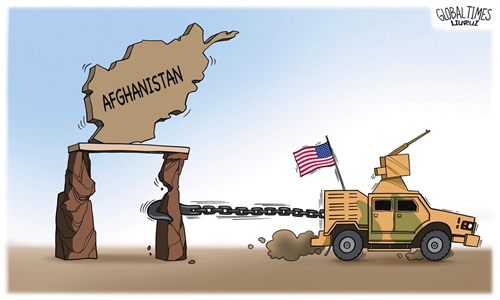
Taliban militants are seen inside the Kandahar city, southern Afghanistan, Aug. 13, 2021. Taliban militants on Friday claimed to have taken control over key southern Afghan cities of Lashkar Gah and Kandahar, after weeks of heavy clashes between the Taliban and government forces. Photo:Xinhua
The Afghan Taliban's military offensive has been moving faster than observers worldwide have expected, and it looks like it is just a matter of time before Kabul is taken, as latest reports from foreign media showed that the Taliban fighters have entered the capital and are negotiating with Afghan government officials on a peaceful transition of power.
Although some voices from the West are expecting China to play a bigger role in Afghanistan after the sudden US pullout, even are speculating that China might send troops to fill the vacuum left by the US, Chinese experts said such speculation is totally groundless, and the most China can do is to evacuate Chinese nationals if a massive humanitarian crisis occurs, or to contribute to post-war reconstruction and development, pushing forward projects under the China-proposed Belt and Road Initiative (BRI) when safety and stability are restored in the war-torn country.
The US can't just leave and take no more responsibility in the region, and if Afghanistan encounters serious humanitarian problems, such as a refugee crisis, Washington should cooperate with other regional countries and at least provide economic assistance, because it was the US that has created this mess, experts noted.
If the Taliban builds a new country after it takes complete control, it should keep its promise to cut off all ties with terrorists, extremists and separatists - the "Three Evils" - in the region, and make sure Afghanistan does not become a breeding ground for those forces. Only by doing so can it win more recognition worldwide than it had before the US invasion after 9/11, Chinese analysts said. They noted that if Afghanistan becomes a breeding ground for the "Three Evils," the UN Security Council may consider sending a UN peacekeeping force into the country.
US humiliation
According to AP, Taliban fighters entered Kabul on Sunday and sought the unconditional surrender of the central government, officials said, as Afghans and foreigners alike raced for the exit, signaling the end of a 20-year Western experiment aimed at remaking Afghanistan.
Afghan President Ashraf Ghani and First Vice President Amrullah Saleh have left the country and headed to Tajikistan, from where they are going to a third country, media reported.
The beleaguered Afghan central government, meanwhile, hopes for an interim administration, but increasingly had few cards to play… Helicopters buzzed overhead, some apparently evacuating personnel at the US Embassy. Several other Western missions were also preparing to get staff out, AP reported.
Many netizens worldwide compared the current situation with the US evacuation from Saigon (now called Ho Chi Minh City), Vietnam in 1975, to mock the US failure and pointless military actions in the developing world, as well as those people who still have wishful thinking when it comes to the US government.
Some Chinese web users said on China's Twitter-like social media platform Sina Weibo that "those people who deeply believe in the US never learn the lesson, they just get abandoned by Americans like rubbish," and "the 20-year war ends like a joke. American soldiers died for nothing, the Taliban returned, and the only change is more people have died and American taxpayers have wasted their money to feed the US military-industrial tycoons."
Earlier the same day, according to Al Jazeera, the Taliban had taken control of Afghanistan's Jalalabad without a fight, according to officials and a resident, effectively leaving the capital Kabul as the last major urban area under government control.
Zhu Yongbiao, director of the Center for Afghanistan Studies in Lanzhou University, told the Global Times on Sunday that "the Taliban's progress is faster than expected. Previously, many observers worldwide expressed concern that the Taliban's military actions would cause a massive humanitarian crisis, but in fact, the Taliban's performance has not been bad so far."
"We didn't see massacres or women get abused, and most major cities were captured without a fight. There are some accusations against the Taliban, but we didn't see hard evidence yet. The US embassy's evacuation also didn't get interrupted or attacked even though the Taliban troops have already entered Kabul. All of this shows that the war won't end violently," Zhu said.
On July 28, 2021, Chinese State Councilor and Foreign Minister Wang Yi met in Tianjin with the visiting delegation led by head of the Afghan Taliban Political Commission Mullah Abdul Ghani Baradar. The heads of the Afghan Taliban's religious council and publicity committee were also part of the delegation.
Wang pointed out, "We hope the Afghan Taliban will make a clean break with all terrorist organizations including ETIM (East Turkestan Islamic Movement) and resolutely and effectively combat them to remove obstacles, play a positive role and create enabling conditions for security, stability, development and cooperation in the region."
Baradar told Wang in Tianjin that "the Afghan Taliban will never allow any force to use the Afghan territory to engage in acts detrimental to China. The Afghan Taliban believes that Afghanistan should develop friendly relations with neighboring countries and the international community."
Zhu said that the world needs to be prepared to deal with a new Afghanistan under Taliban control, and the key is whether the Taliban would keep its promise to make sure no force can use their country's soil to threaten other countries in the region, and be more inclusive rather than extreme, and then more countries will recognize the country.

A US Chinook helicopter flies over the U.S. Embassy in Kabul, Afghanistan on Sunday. Helicopters are landing at the US embassy there as diplomatic vehicles leave the compound as the Taliban advance on the Afghan capital. Photo: VCG
What can China do?
In Tianjin last month, Wang also said that "the hasty withdrawal of the US and NATO troops from Afghanistan actually marks the failure of the US policy on Afghanistan. The Afghan people now have an important opportunity to achieve national stability and development."
But some voices from the West still want to make excuses for the US' humiliation. Reuters published an analysis on Sunday entitled: As Taliban advances, China lays groundwork to accept an awkward reality.
The article said the Taliban's momentum as US forces withdraw is awkward for China, which has blamed religious extremism as a destabilizing force in its western Xinjiang region and has long worried that Taliban-controlled territory would be used to harbor separatist forces.
In fact, the US is the one that should have felt embarrassed and awkward, said Chinese analysts, and the reason why some Western media or analysts made such comments is that they want China to repeat the mistake made by the US - "stepping on the ground of the graveyard of empires."
Zhu said the West is trying to set traps for China. "The current situation is a mess for the US, and will impact countries in the region, and then the impact will come to us [China]. If the Taliban controls the country immediately and brings about stability, this would not be bad news. Extremism and terrorism would be restrained in a stable country that realizes a peaceful transfer without chaos."
Of course, some "Three Evils" forces in the region will be encouraged, but Afghanistan's impact on China should not be exaggerated, and the US is the one with the headache, Zhu said. He noted that other anti-government armed forces in the region are unlikely to replicate the progress that Taliban has made in Afghanistan.
Pan Guang, a senior expert on counter-terrorism and Afghan studies at the Shanghai Academy of Social Sciences, told the Global Times on Sunday that "in order to prevent the situation from spilling over, China has already started counter-terrorism cooperation with other countries in the region including Tajikistan and Pakistan to strengthen border control."
What China could do is participate in the post-war reconstruction and provide investment to help the country's future development, Pan said.
"The US can't just run away. It should also take responsibility to rebuild the country and provide assistance. Washington should be supportive of international cooperation on anti-drug and refugee issues," Pan said. "If Afghanistan encounters a huge crisis in the future, the UN Security Council would need to be united and pass a resolution to send a peacekeeping force, and this would need the US to be supportive and responsible as well."


